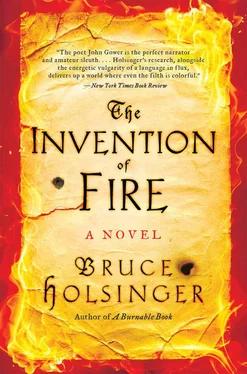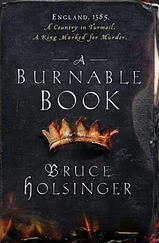Bruce Holsinger - The Invention of Fire
Здесь есть возможность читать онлайн «Bruce Holsinger - The Invention of Fire» — ознакомительный отрывок электронной книги совершенно бесплатно, а после прочтения отрывка купить полную версию. В некоторых случаях можно слушать аудио, скачать через торрент в формате fb2 и присутствует краткое содержание. Год выпуска: 2015, Издательство: HarperCollins, Жанр: Исторический детектив, на английском языке. Описание произведения, (предисловие) а так же отзывы посетителей доступны на портале библиотеки ЛибКат.
- Название:The Invention of Fire
- Автор:
- Издательство:HarperCollins
- Жанр:
- Год:2015
- ISBN:нет данных
- Рейтинг книги:3 / 5. Голосов: 1
-
Избранное:Добавить в избранное
- Отзывы:
-
Ваша оценка:
- 60
- 1
- 2
- 3
- 4
- 5
The Invention of Fire: краткое содержание, описание и аннотация
Предлагаем к чтению аннотацию, описание, краткое содержание или предисловие (зависит от того, что написал сам автор книги «The Invention of Fire»). Если вы не нашли необходимую информацию о книге — напишите в комментариях, мы постараемся отыскать её.
The Invention of Fire — читать онлайн ознакомительный отрывок
Ниже представлен текст книги, разбитый по страницам. Система сохранения места последней прочитанной страницы, позволяет с удобством читать онлайн бесплатно книгу «The Invention of Fire», без необходимости каждый раз заново искать на чём Вы остановились. Поставьте закладку, и сможете в любой момент перейти на страницу, на которой закончили чтение.
Интервал:
Закладка:
“Hardly,” I said. “My residence is as far from the Guildhall as it can be. No city politics for me.”
“You are a wise man,” he laughed, then, in a lower voice fragrant with a noontime cider, “Brembre cannot depart these precincts soon enough, I tell you. The man is a tyrant, some new Nero laying waste to the city. Even Exton will be a better pick, despite his current lodging in Brembre’s purse. How the fair Idonia stands for such mistreatment I will never know.”
Nicholas Exton, newly elected mayor, would be inaugurated at the end of October. Chaucer had told me of Pinkhurst’s besotted admiration for Idonia, the current mayor’s wife. While I already knew of his contempt for Brembre, I wouldn’t have expected him to risk such incautious vitriol in front of me.
“We shall hope that Exton brings a new golden age to the Guildhall, then,” I said.
Pinkhurst shifted on his feet. He had spoken rather too loosely, and seemed to know it. “Well.” He nodded. “You will excuse me, Gower. A pie seeker’s quest is not to be taken lightly.”
“No indeed,” I said, and watched him spin on his heel, then disappear in the crowd bunched near the corner of Cat Street.
Only a few moments passed before I saw Gil Cheddar approaching from the opposite direction. The acolyte had shed his robes and now looked like any respectable young man taking the air on a London afternoon, though his eyes widened when he saw me standing by the coops. As he approached he shot worried glances up and down Basinghall Street.
“Here?” I asked him.
A nervous sulk. “Ask your questions, Master Gower.”
“Fine then. I understand you spoke to our good hermit.”
“Aye.”
“You spoke to him about a company entering the city, yes?”
“Aye.”
“A company of Welshmen.”
“Aye.”
“Through Cripplegate.”
“Aye.”
“And when did you see these men, Cheddar?”
He thought about it. “More than ten days ago it would have been. A Thursday, of that I am certain. It was Holyrood Day.”
Five days before Peter Norris had seen the Welshmen circling the gateyard.
“I was sent by the parson to help with the night service. Was after cleaning up from that and dodging home when I saw them.”
“What were they doing?”
“Walking through the lodge doors at Cripplegate, and well after curfew bell, too. Can’t say I wasn’t surprised, such a large group of them.” The outer wall of the Cripplegate lodge was served by two doors for use after the shutting of the gates each night. Any company of outsiders entering the city that late would not fail to attract notice, and demands for bribes.
“Surely someone must have bought them in.”
“Aye.”
Silence.
“And who might that have been?” My purse came out. He saw it. He twisted on a toe, scratching his reluctance in the dirt. He glanced in both directions and blew out a breath.
“Father’s who it was. Left after the service and met them up the street without the walls, below the Moorfields. The parson led them to the gate himself, hustling them along. I was standing on the St. Giles west porch. Had a knot in my breech tie, was trying to untangle it. I saw him leave by the vestry door, go up toward the Moorfields, then he was back quick as you please, hurrying them for the gate, like he was a sheeper herding ewes.”
Robert Langdon, the parson of St. Giles Cripplegate, a respected clergyman, buying entrance to the city for a crew of Welshmen. How extraordinarily odd. Purchasing their deaths, too? But whatever for?
“What can you tell me, Will, about Father Robert’s motivation? Did you learn the origin of his entanglement with these Welshmen?”
“Aye,” he said with a slight smile. “There was another man with them. Not a Welshman but a Londoner, I’d warrant, hanging back with Father.” His reluctance was now gone, as if he’d been waiting for the chance to spill. “They were standing just nigh the ditch. The first of the Welshmen were passing through the lodge. The other fellow, he was getting directions from Father.”
“Directions to where?”
“To a tenement house off Thames Street, Queenhithe Ward. To a house in the parish rents of St. Giles. I know it, as I ran an errand there for the curate only last month.”
“Could you take me to it?”
“Aye, but-”
“Now.”
We passed down Ironmongers Lane and over Cheapside, soon reaching Thames Street and the quayside, where Cheddar turned east into Queenhithe Ward. This low way hard by the river smelled eternally of fish, which were cleaned right on the quays, strings of filth laid bare to the sun and washed away only at the end of the day, with the fresh catch hauled off by the fishmongers for sale in the markets. We paused at one point to allow a dungboat to take a load from three waiting carts. The gongfarmers shoveled the slop on board as a water bailiff watched primly from his skiff thirty feet off the quay, eager for a violation and a bribe.
Once the carts had cleared the quay we made our way another hundred feet. Cheddar angled up a crooked street leading north from the bank. He stopped in front of a house towering high over the narrow way. Few windows interrupted the flat surface of the outer wall, which was traversed by diagonal timbers cracked in several places. The door, opened to the street and splintered along one side, hung loosely from leather hinges. It gave onto a low front room, empty but for an octagonal standing table shoved against the far wall. The rushes, rotted and broken, covered only a portion of the splintered floor. The back room was in no better shape, nor was the kitchen, a sunken space shared with the two upper floors. Here several of the larger hearthstones had been removed. Two dented pans hung off hooks on the east wall, the whole of which leaned slightly forward, threatening to collapse inward.
The rear of the building shared a rectangular courtyard with four similar tenements, though the structure seemed in much worse shape than the others. An uncovered staircase climbed up the house’s back face. I took the steps gingerly, testing the next before leaving the last. The top two floors resembled the first in their condition, though unlike the lower part of the house, these stories showed evidence of recent habitation: sleeping pallets, several torn or soiled garments, a clay jug and a piss pot, a molded hunk of bread.
Sixteen Welshmen, sharing two floors. Not unthinkable in this section of the city, where the tenements clustered densely above and below Thames Street.
Cheddar’s attention was directed out the sole window onto the narrower lane. “Where are they now, do you suppose?” I asked him.
He shook his head. “It’s what I was trying to tell you, before you rushed us down here.” His palms faced outward, putting his silence on me. “Father Robert said it to the other man. I heard it plain from the porch. ‘Four days,’ he said. ‘Four days they can stay, then they must be moved. After that they are the Guildhall’s problem.’ Been more than four days, sure, and no one the wiser. As to where they are now? Couldn’t say. Nor, I suspect, could Father Robert.”
Though I could, or so I believed. The Welshmen brought into the city by the parson of St. Giles were now feeding the worms of St. Bart’s, after an ugly sacrifice of their corpses at the shrine of St. Dung. A terrible end to sixteen unknown lives.
There was one part of Cheddar’s story that lodged in my throat like a half-swallowed bone.
The Guildhall’s problem.
Yet it was the Guildhall, in the person of Ralph Strode, that had set me off on this strange pursuit in the first place, despite the mayor’s reluctance to have the matter plumbed. I did not think for a moment that my friend was involved in the deaths of these men. Yet to imagine the mayor, or perhaps an alderman or two, concealing or even sanctioning these foul murders, then keeping the information from Strode-and Welshmen? England was not at war with Wales, any more than London was at war with York.
Читать дальшеИнтервал:
Закладка:
Похожие книги на «The Invention of Fire»
Представляем Вашему вниманию похожие книги на «The Invention of Fire» списком для выбора. Мы отобрали схожую по названию и смыслу литературу в надежде предоставить читателям больше вариантов отыскать новые, интересные, ещё непрочитанные произведения.
Обсуждение, отзывы о книге «The Invention of Fire» и просто собственные мнения читателей. Оставьте ваши комментарии, напишите, что Вы думаете о произведении, его смысле или главных героях. Укажите что конкретно понравилось, а что нет, и почему Вы так считаете.












